Module10【复习课件】-2022-2023学年七年级英语下册单元复习过过过(外研版)(共38张PPT)
文档属性
| 名称 | Module10【复习课件】-2022-2023学年七年级英语下册单元复习过过过(外研版)(共38张PPT) | 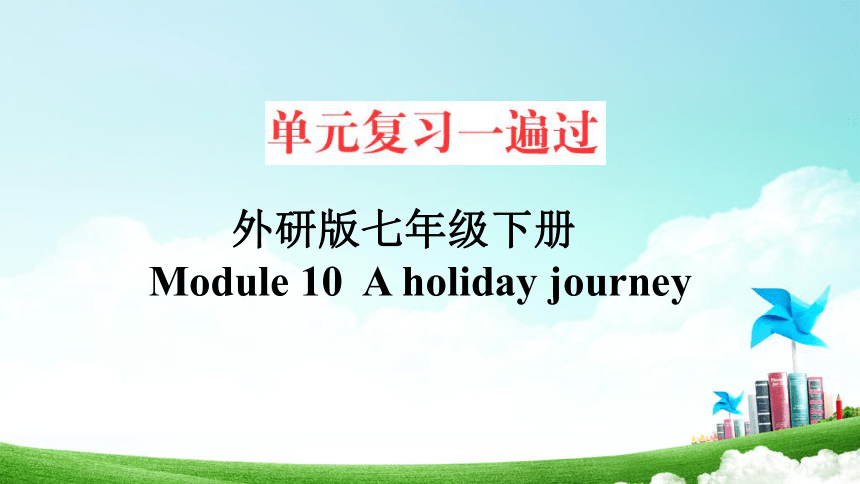 | |
| 格式 | pptx | ||
| 文件大小 | 39.2MB | ||
| 资源类型 | 教案 | ||
| 版本资源 | 外研版 | ||
| 科目 | 英语 | ||
| 更新时间 | 2023-05-07 21:00:47 | ||
图片预览

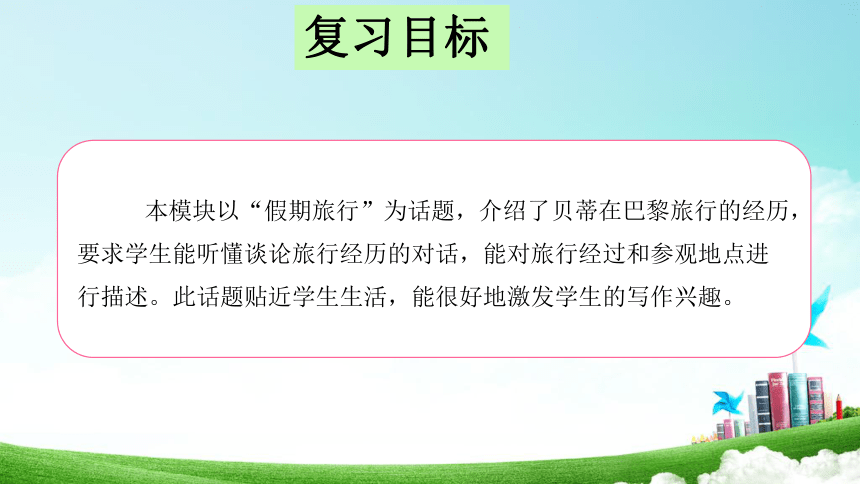
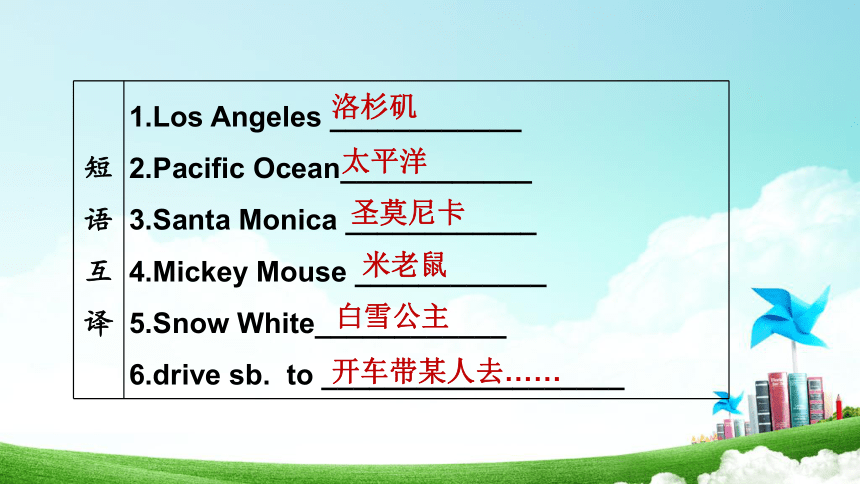
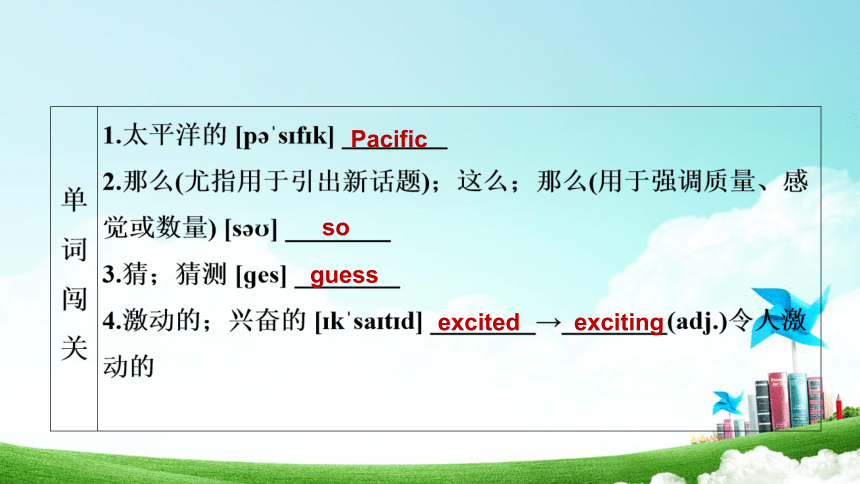

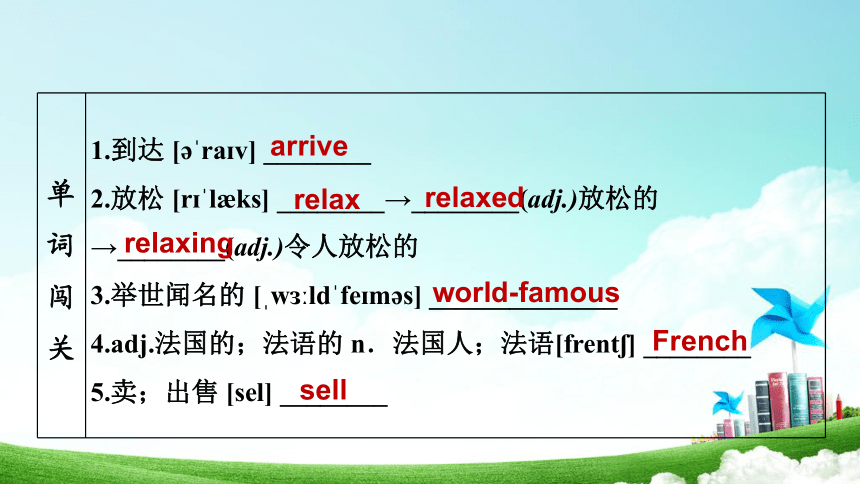
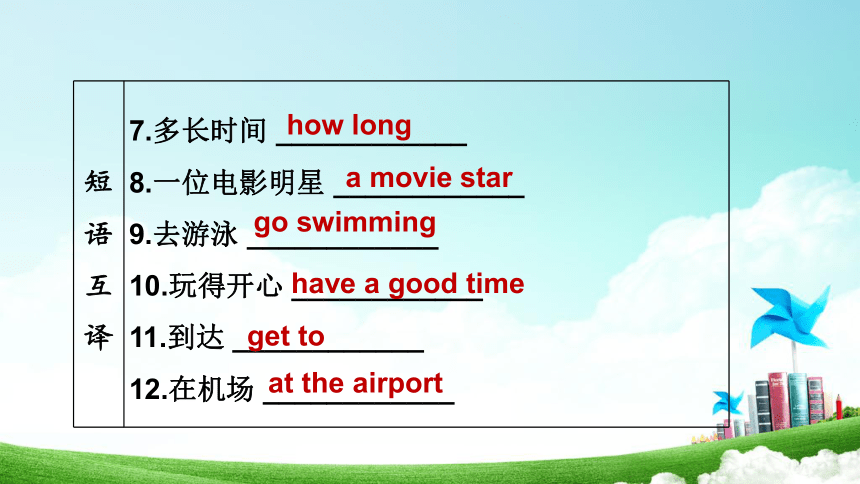
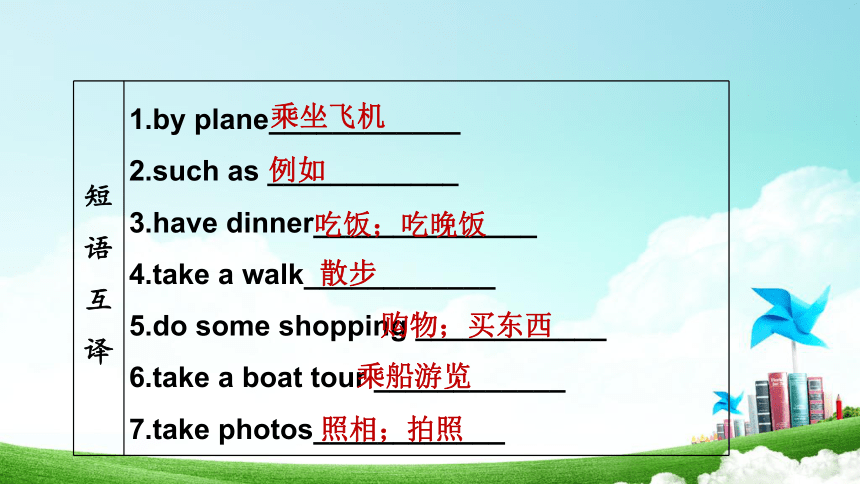
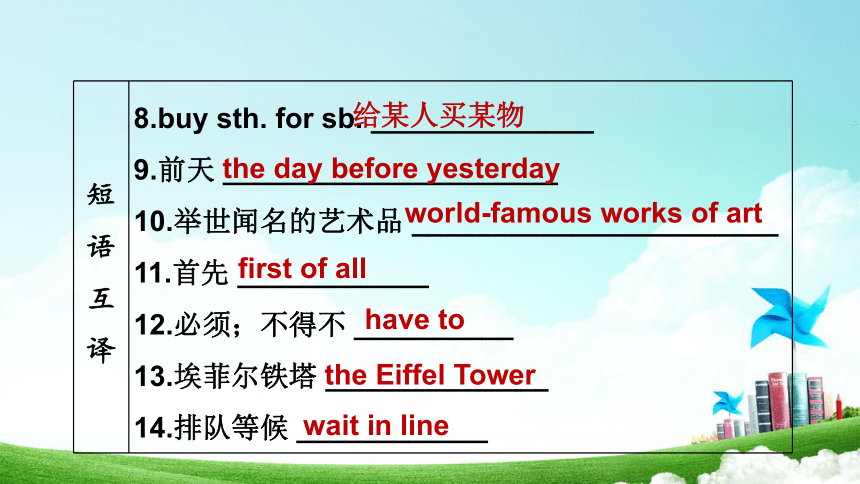
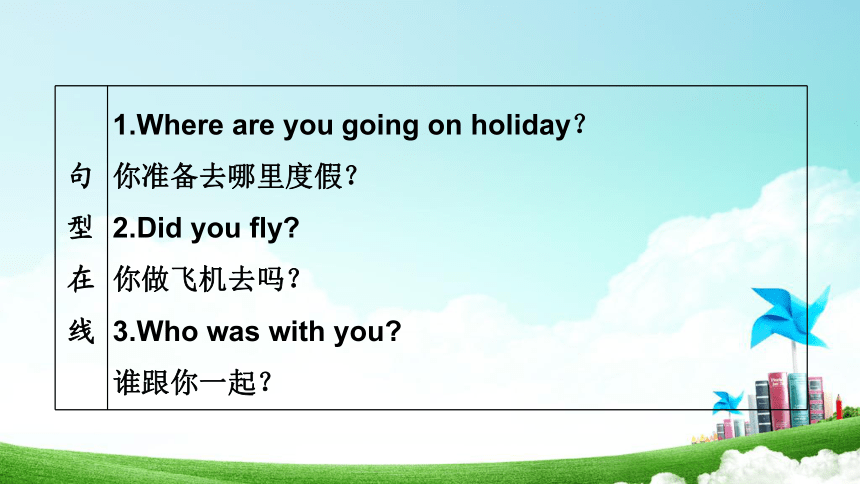
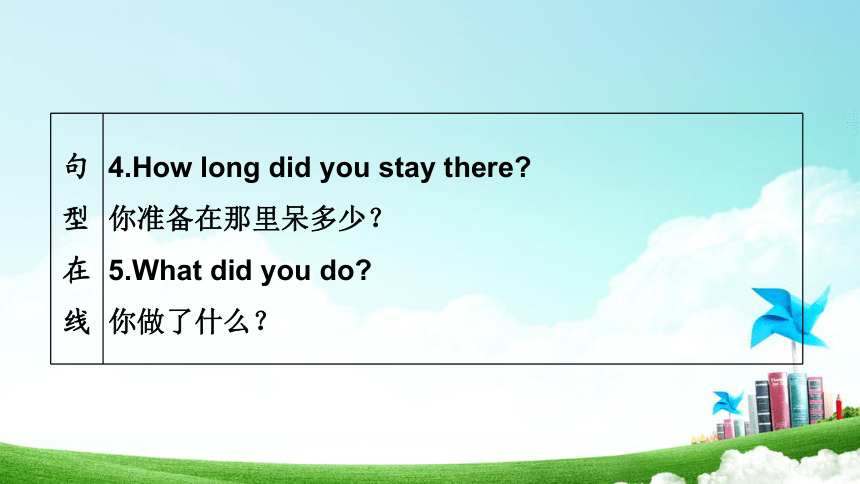
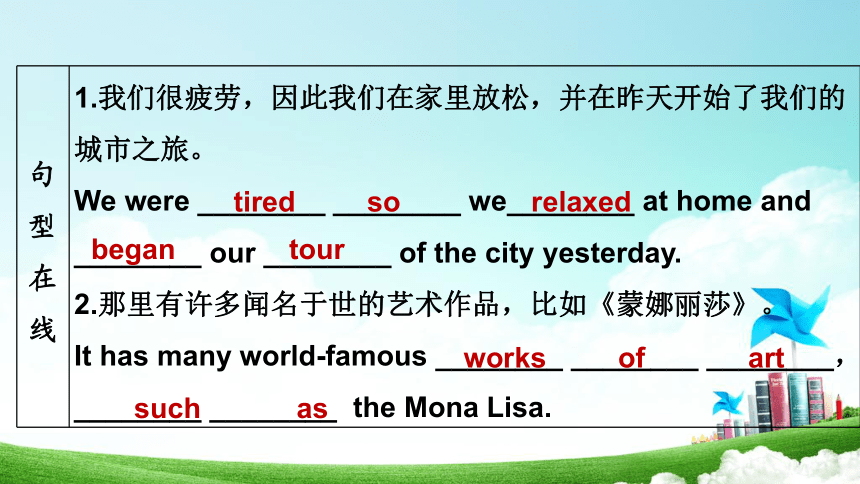
文档简介
(共38张PPT)
外研版七年级下册
Module 10 A holiday journey
本模块以“假期旅行”为话题,介绍了贝蒂在巴黎旅行的经历,要求学生能听懂谈论旅行经历的对话,能对旅行经过和参观地点进行描述。此话题贴近学生生活,能很好地激发学生的写作兴趣。
复习目标
短语互译 1.Los Angeles ____________
2.Pacific Ocean____________
3.Santa Monica ____________
4.Mickey Mouse ____________
5.Snow White____________
6.drive sb. to ___________________
洛杉矶
太平洋
圣莫尼卡
米老鼠
白雪公主
开车带某人去……
Pacific
so
guess
excited
exciting
单词闯关 6.顶端 [t p] ________
7.直到……为止 [t l] ________→________(同义词)
8.电灯 [la t] ________
9.在使用中;开着的 [ n] ________
10.绝妙的;了不起的 [ w nd fl] ____________
11.宫殿 [ p l s] ________
top
till
until
light
on
wonderful
palace
单词闯关 1.到达 [ ra v] ________
2.放松 [r l ks] ________→________(adj.)放松的→________(adj.)令人放松的
3.举世闻名的 [ w ld fe m s] ______________
4.adj.法国的;法语的 n.法国人;法语[frent ] ________
5.卖;出售 [sel] ________
arrive
relax
relaxed
relaxing
world famous
French
sell
短语互译 7.多长时间 ____________
8.一位电影明星 ____________
9.去游泳 ____________
10.玩得开心 ____________
11.到达 ____________
12.在机场 ____________
how long
a movie star
go swimming
have a good time
get to
at the airport
短语互译 1.by plane____________
2.such as ____________
3.have dinner______________
4.take a walk____________
5.do some shopping ____________
6.take a boat tour ____________
7.take photos____________
乘坐飞机
例如
吃饭;吃晚饭
散步
购物;买东西
乘船游览
照相;拍照
短语互译 8.buy sth. for sb. ______________
9.前天 _____________________
10.举世闻名的艺术品 _______________________
11.首先 ____________
12.必须;不得不 __________
13.埃菲尔铁塔 ______________
14.排队等候 ____________
给某人买某物
the day before yesterday
world famous works of art
first of all
have to
the Eiffel Tower
wait in line
句型在线 1.Where are you going on holiday?
你准备去哪里度假?
2.Did you fly
你做飞机去吗?
3.Who was with you
谁跟你一起?
句型在线 4.How long did you stay there
你准备在那里呆多少?
5.What did you do
你做了什么?
句型在线 1.我们很疲劳,因此我们在家里放松,并在昨天开始了我们的城市之旅。
We were ________ ________ we________ at home and ________ our ________ of the city yesterday.
2.那里有许多闻名于世的艺术作品,比如《蒙娜丽莎》。
It has many world famous ________ ________ ________,________ ________ the Mona Lisa.
tired so
relaxed
began
tour
works of art
such as
句型在线 3.他们卖的水果和蔬菜非常好。
They________ ________ ________ fruit and vegetables.
4.我希望你会喜欢它!
I hope ________ ________ it!
5.我们一直等到所有的灯都亮了起来。
We waited ________ all the lights ________ ________.
sell such good
you’ll like
till
were on
句型在线 6.(那里)有大量的游客,所以我们不得不首先排一个小时的队,然后我们到达了顶部。
There were ________ ________ tourists,so ________ ________ ________, we________ ________ ________ ________ ________ ________an hour,and then we went to the top.
lots of
first
of all
had to wait
in line for
一般过去时
一般过去时的陈述句变为特殊疑问句的步骤如下:
(1)确定疑问词:人who/whom,物________,地点________,时间when/what time,原因________,频率____________,长度how long, 距离____________等。
what
where
why
how often
how far
They gave the concert last night.
→When did they give the concert
一般过去时
(2)结构形式:
疑问词+一般疑问句(情态动词/助动词/was/were+主语+其他)?
We stayed in a hotel near the station.
我们待在车站附近的一个旅馆里。
→Where did you stay 你们待在哪儿?
一般过去时
[解析]考查疑问词辨析。句意:“你上周进行了一次游学活动。你在长沙待了多长时间?”“三天。”how soon意为“多久以后”,通常对“in+一段时间”提问;how long意为“多长时间”,对“for+一段时间”提问;how far意为“多远”,对距离提问。根据答语“For three days”可知选B。
2019·湘西 —You had a study tour last week.
________ did you stay in Changsha
—For three days.
A.How soon B.How long C.How far
B
一般过去时
( )2019·南通 —________ did you celebrate the Dragon Boat Festival this year, Tom
—By making rice dumplings with my Chinese friends.
A.Where B.When C.How D.Why
C
[解析]考查疑问词辨析。句意:“汤姆,你今年是如何庆祝端午节的?”“和我的中国朋友一起包粽子。”根据答语“By making rice dumplings with my Chinese friends”可知问句是询问方式。
一般过去时
用适当的疑问词(组)填空
1.—____________ did you go to the beach with
—My parents.
2.—____________ did you read the newspaper
—At the school library.
3.—____________ did they get to the station
—They took the underground.
Who
Where
How
一般过去时
4.—____________ did your father do just now
—He cleaned the kitchen just now.
5.—____________ fruit did your sister buy
—Two kilos.
6.—____________ did Lingling play computer games
—For twenty minutes.
What
How much
How long
考点精讲
1. Where are you going on holiday, Tony
be on holiday 或 have a holiday 在“度假”We’ll be on summer holiday. = We’ll have a summer holiday. (1)for a holiday 去度假 I am going to Australia for a holiday. 我打算去澳大利亚度假。
(2)have/take a holiday 度假;休假(动词短语) You look tired—you should take a holiday. 你看上去很累,你应该休假。
2. I went there two years ago and enjoyed it a lot.
(1) a lot表示程度,相当于very much,常修饰形容词或副词的比较级或动词。 Thanks a lot.=Thank you very much. 非常感谢。
(2)a lot 还可用作名词短语,意为“许多;大量”,相当于代词many或much,在句中可作主语、表语或宾语。This question is a lot more difficult than that one. 这个问题比那个难得多。
3.I was so excited!
(1) excited的主语通常是人或常用来修饰人。
其常用短语:be excited about 对……感到兴奋Are you excited about going to Beijing 你对去北京感到兴奋吗?
(2) exciting的主语通常是物或常用来修饰物,在句中既可作表语,又可作定语;其反义词是boring(令人厌烦的)。They waited and waited for something exciting to happen.他们等啊等啊,等待着激动人心的事情发生。
4. A holiday journey
(1)trip有目的性的旅行,强调“短期旅行”,口语上trip和journey可互换。
a trip to the zoo 去南京的旅行 go/be on a trip / journey to Nanjing
(2)tour n. 常表示“(周游各地的)参观、访问、(巡回)旅游、演出”等
the tour of London
(3)travel n./ v. 算是一个总称, 一般指长途旅行,或到国外或远方旅行。 Now many people are fond of travel in their free time. Light travels faster than sound.
考点精讲
5. Jenny and I arrived by plane the day before yesterday.
arrive意为“到达”,须与介词in或at连用,再接地点名词。
arrive in表示“相对较大的地方”,arrive at表示“相对较小的地方” Li Ming arrived in Beijing at the train station yesterday morning.
李明昨天早晨到达了北京、火车站。
arrive in/at=get to=reach, 均译为“到达”。 get home 到家; arrive here 到这儿; get there 到那儿 I get home at 7:00 pm every day。 When we reached the park, it began to rain.
6. We were tired so we relaxed at home.
考点精讲
relax v. 休息;放松;使 ...... 放松 I often relax myself by listening to music. I am so tried, may I have a relax 【拓展】 relaxing adj. 令人放松的 (跟物有关)
Watching movies is really relaxing. relaxed adj. 感到放松 (跟人有关)
He felt relaxed when he heard the news.
考点精讲
7.We waited till all the lights were on.
till通常可以与until互换,但until较为正式。其用法如下:
(1)till作连词时,通常指“(时间上/程度上)直到……为止”。(2)till作介词时,常与stay或wait等延续性动词连用,表示时间的终点。(3)till与短暂性动词连用,常用结构为not...till/until,意为“直到……才……”。
We must stick to our task till it is finished. People do not know the value of health till they lose it. He didn't get there till dark. 他直到天黑才到达那里。 He didn’t go to bed until his father came back.
8. They sell such good fruit and vegetables.
such 是形容词,意为“如此的, 这样的”,修饰名词或名词短语, 常用于以下结构: such+a/an+adj.+可数名词单数; such+adj.+不可数名词/可数名词复数。It’s such a beautiful place. 它是一个如此美丽的地方。He is such a clever boy that he can solve all the problems.他是如此聪明的男孩他可以解决所有问题。
8. They sell such good fruit and vegetables.
【拓展】 so 是副词,意为“如此, 这样”,修饰形容词或副词, 常用于以
下结构: so+adj./adv.; so+ adj.+a/an+可数名词单数。 It’s so beautiful a place.
它是一个如此美丽的地方。
【注意】名词前面有many, few, much, little(少的)修饰时, 要用so,不用such。 Look! There are so many pears on the tree.
看,树上有这么多的梨。
本模块以“假期旅行”为话题,介绍了贝蒂在巴黎旅行的经
历,要求学生能听懂谈论旅行经历的对话,能对旅行经过和
参观地点进行描述。此话题贴近学生生活,能很好地激发学
生的写作兴趣。
写 作 案 例
请你以“My Happy Holiday Journey”为题,写一篇60词
左右的英语短文,介绍一下自己的泰山(Mount Tai)之旅。
素 材 积 累
1.度假 ________________
2.参观 ________________
3.计划 ________________
4.旅行 ________________
5.到达 ______________________
on holiday
visit
plan
travel
arrive at/in/get to/reach
素 材 积 累
6.举世闻名的 ________________
7.乘飞机/火车/汽车 ________________
8.购物 ________________
9.给某人买某物 ________________
10.玩得开心 ________________
world famous
by plane/train/car
do some shopping
buy sth. for sb.
have a good/great/wonderful/nice time/enjoy
oneself/have fun
1.出生 ____________ 2.著名的 _________
3.在……岁时 ____________ 4.开始 _________
5.结婚 ________ 6.成为 __________
7.作品;著作 _______ 8.年轻的 ________
9.语言 _________ 10.成功的 _________
be born
famous
at the age of
begin
marry
become
work
young
language
successful
素 材 积 累
句型
1.I went to…during…
2.It took us…to get there.
3.In the morning/afternoon/evening, we…
4.We visited/took photos of…
5.We were tired, but we all…
范文赏析
My Happy Holiday Journey
①During my last summer holiday, I took a bus to Mount Tai with my good friends. It took us about two hours to get there. Then we ②began to climb the mountain. There were many trees and flowers on it. And there were also a lot of visitors. Some of them were foreigners. At noon, we sat under the trees and had a picnic. All the food was delicious.
We took many photos during the trip. ③We were tired, but we all had a great time.
范文赏析
①点明主题,总领全文,为下文的描述做好铺垫。
②以较多的句子详细描述了旅行的过程,began, were, sat, had, took等动词过去式的使用,既体现了本模块的重点语法,又较好地介绍了旅行的经过。
③表达了作者对这次旅行的感受。
外研版七年级下册
Module 10 A holiday journey
本模块以“假期旅行”为话题,介绍了贝蒂在巴黎旅行的经历,要求学生能听懂谈论旅行经历的对话,能对旅行经过和参观地点进行描述。此话题贴近学生生活,能很好地激发学生的写作兴趣。
复习目标
短语互译 1.Los Angeles ____________
2.Pacific Ocean____________
3.Santa Monica ____________
4.Mickey Mouse ____________
5.Snow White____________
6.drive sb. to ___________________
洛杉矶
太平洋
圣莫尼卡
米老鼠
白雪公主
开车带某人去……
Pacific
so
guess
excited
exciting
单词闯关 6.顶端 [t p] ________
7.直到……为止 [t l] ________→________(同义词)
8.电灯 [la t] ________
9.在使用中;开着的 [ n] ________
10.绝妙的;了不起的 [ w nd fl] ____________
11.宫殿 [ p l s] ________
top
till
until
light
on
wonderful
palace
单词闯关 1.到达 [ ra v] ________
2.放松 [r l ks] ________→________(adj.)放松的→________(adj.)令人放松的
3.举世闻名的 [ w ld fe m s] ______________
4.adj.法国的;法语的 n.法国人;法语[frent ] ________
5.卖;出售 [sel] ________
arrive
relax
relaxed
relaxing
world famous
French
sell
短语互译 7.多长时间 ____________
8.一位电影明星 ____________
9.去游泳 ____________
10.玩得开心 ____________
11.到达 ____________
12.在机场 ____________
how long
a movie star
go swimming
have a good time
get to
at the airport
短语互译 1.by plane____________
2.such as ____________
3.have dinner______________
4.take a walk____________
5.do some shopping ____________
6.take a boat tour ____________
7.take photos____________
乘坐飞机
例如
吃饭;吃晚饭
散步
购物;买东西
乘船游览
照相;拍照
短语互译 8.buy sth. for sb. ______________
9.前天 _____________________
10.举世闻名的艺术品 _______________________
11.首先 ____________
12.必须;不得不 __________
13.埃菲尔铁塔 ______________
14.排队等候 ____________
给某人买某物
the day before yesterday
world famous works of art
first of all
have to
the Eiffel Tower
wait in line
句型在线 1.Where are you going on holiday?
你准备去哪里度假?
2.Did you fly
你做飞机去吗?
3.Who was with you
谁跟你一起?
句型在线 4.How long did you stay there
你准备在那里呆多少?
5.What did you do
你做了什么?
句型在线 1.我们很疲劳,因此我们在家里放松,并在昨天开始了我们的城市之旅。
We were ________ ________ we________ at home and ________ our ________ of the city yesterday.
2.那里有许多闻名于世的艺术作品,比如《蒙娜丽莎》。
It has many world famous ________ ________ ________,________ ________ the Mona Lisa.
tired so
relaxed
began
tour
works of art
such as
句型在线 3.他们卖的水果和蔬菜非常好。
They________ ________ ________ fruit and vegetables.
4.我希望你会喜欢它!
I hope ________ ________ it!
5.我们一直等到所有的灯都亮了起来。
We waited ________ all the lights ________ ________.
sell such good
you’ll like
till
were on
句型在线 6.(那里)有大量的游客,所以我们不得不首先排一个小时的队,然后我们到达了顶部。
There were ________ ________ tourists,so ________ ________ ________, we________ ________ ________ ________ ________ ________an hour,and then we went to the top.
lots of
first
of all
had to wait
in line for
一般过去时
一般过去时的陈述句变为特殊疑问句的步骤如下:
(1)确定疑问词:人who/whom,物________,地点________,时间when/what time,原因________,频率____________,长度how long, 距离____________等。
what
where
why
how often
how far
They gave the concert last night.
→When did they give the concert
一般过去时
(2)结构形式:
疑问词+一般疑问句(情态动词/助动词/was/were+主语+其他)?
We stayed in a hotel near the station.
我们待在车站附近的一个旅馆里。
→Where did you stay 你们待在哪儿?
一般过去时
[解析]考查疑问词辨析。句意:“你上周进行了一次游学活动。你在长沙待了多长时间?”“三天。”how soon意为“多久以后”,通常对“in+一段时间”提问;how long意为“多长时间”,对“for+一段时间”提问;how far意为“多远”,对距离提问。根据答语“For three days”可知选B。
2019·湘西 —You had a study tour last week.
________ did you stay in Changsha
—For three days.
A.How soon B.How long C.How far
B
一般过去时
( )2019·南通 —________ did you celebrate the Dragon Boat Festival this year, Tom
—By making rice dumplings with my Chinese friends.
A.Where B.When C.How D.Why
C
[解析]考查疑问词辨析。句意:“汤姆,你今年是如何庆祝端午节的?”“和我的中国朋友一起包粽子。”根据答语“By making rice dumplings with my Chinese friends”可知问句是询问方式。
一般过去时
用适当的疑问词(组)填空
1.—____________ did you go to the beach with
—My parents.
2.—____________ did you read the newspaper
—At the school library.
3.—____________ did they get to the station
—They took the underground.
Who
Where
How
一般过去时
4.—____________ did your father do just now
—He cleaned the kitchen just now.
5.—____________ fruit did your sister buy
—Two kilos.
6.—____________ did Lingling play computer games
—For twenty minutes.
What
How much
How long
考点精讲
1. Where are you going on holiday, Tony
be on holiday 或 have a holiday 在“度假”We’ll be on summer holiday. = We’ll have a summer holiday. (1)for a holiday 去度假 I am going to Australia for a holiday. 我打算去澳大利亚度假。
(2)have/take a holiday 度假;休假(动词短语) You look tired—you should take a holiday. 你看上去很累,你应该休假。
2. I went there two years ago and enjoyed it a lot.
(1) a lot表示程度,相当于very much,常修饰形容词或副词的比较级或动词。 Thanks a lot.=Thank you very much. 非常感谢。
(2)a lot 还可用作名词短语,意为“许多;大量”,相当于代词many或much,在句中可作主语、表语或宾语。This question is a lot more difficult than that one. 这个问题比那个难得多。
3.I was so excited!
(1) excited的主语通常是人或常用来修饰人。
其常用短语:be excited about 对……感到兴奋Are you excited about going to Beijing 你对去北京感到兴奋吗?
(2) exciting的主语通常是物或常用来修饰物,在句中既可作表语,又可作定语;其反义词是boring(令人厌烦的)。They waited and waited for something exciting to happen.他们等啊等啊,等待着激动人心的事情发生。
4. A holiday journey
(1)trip有目的性的旅行,强调“短期旅行”,口语上trip和journey可互换。
a trip to the zoo 去南京的旅行 go/be on a trip / journey to Nanjing
(2)tour n. 常表示“(周游各地的)参观、访问、(巡回)旅游、演出”等
the tour of London
(3)travel n./ v. 算是一个总称, 一般指长途旅行,或到国外或远方旅行。 Now many people are fond of travel in their free time. Light travels faster than sound.
考点精讲
5. Jenny and I arrived by plane the day before yesterday.
arrive意为“到达”,须与介词in或at连用,再接地点名词。
arrive in表示“相对较大的地方”,arrive at表示“相对较小的地方” Li Ming arrived in Beijing at the train station yesterday morning.
李明昨天早晨到达了北京、火车站。
arrive in/at=get to=reach, 均译为“到达”。 get home 到家; arrive here 到这儿; get there 到那儿 I get home at 7:00 pm every day。 When we reached the park, it began to rain.
6. We were tired so we relaxed at home.
考点精讲
relax v. 休息;放松;使 ...... 放松 I often relax myself by listening to music. I am so tried, may I have a relax 【拓展】 relaxing adj. 令人放松的 (跟物有关)
Watching movies is really relaxing. relaxed adj. 感到放松 (跟人有关)
He felt relaxed when he heard the news.
考点精讲
7.We waited till all the lights were on.
till通常可以与until互换,但until较为正式。其用法如下:
(1)till作连词时,通常指“(时间上/程度上)直到……为止”。(2)till作介词时,常与stay或wait等延续性动词连用,表示时间的终点。(3)till与短暂性动词连用,常用结构为not...till/until,意为“直到……才……”。
We must stick to our task till it is finished. People do not know the value of health till they lose it. He didn't get there till dark. 他直到天黑才到达那里。 He didn’t go to bed until his father came back.
8. They sell such good fruit and vegetables.
such 是形容词,意为“如此的, 这样的”,修饰名词或名词短语, 常用于以下结构: such+a/an+adj.+可数名词单数; such+adj.+不可数名词/可数名词复数。It’s such a beautiful place. 它是一个如此美丽的地方。He is such a clever boy that he can solve all the problems.他是如此聪明的男孩他可以解决所有问题。
8. They sell such good fruit and vegetables.
【拓展】 so 是副词,意为“如此, 这样”,修饰形容词或副词, 常用于以
下结构: so+adj./adv.; so+ adj.+a/an+可数名词单数。 It’s so beautiful a place.
它是一个如此美丽的地方。
【注意】名词前面有many, few, much, little(少的)修饰时, 要用so,不用such。 Look! There are so many pears on the tree.
看,树上有这么多的梨。
本模块以“假期旅行”为话题,介绍了贝蒂在巴黎旅行的经
历,要求学生能听懂谈论旅行经历的对话,能对旅行经过和
参观地点进行描述。此话题贴近学生生活,能很好地激发学
生的写作兴趣。
写 作 案 例
请你以“My Happy Holiday Journey”为题,写一篇60词
左右的英语短文,介绍一下自己的泰山(Mount Tai)之旅。
素 材 积 累
1.度假 ________________
2.参观 ________________
3.计划 ________________
4.旅行 ________________
5.到达 ______________________
on holiday
visit
plan
travel
arrive at/in/get to/reach
素 材 积 累
6.举世闻名的 ________________
7.乘飞机/火车/汽车 ________________
8.购物 ________________
9.给某人买某物 ________________
10.玩得开心 ________________
world famous
by plane/train/car
do some shopping
buy sth. for sb.
have a good/great/wonderful/nice time/enjoy
oneself/have fun
1.出生 ____________ 2.著名的 _________
3.在……岁时 ____________ 4.开始 _________
5.结婚 ________ 6.成为 __________
7.作品;著作 _______ 8.年轻的 ________
9.语言 _________ 10.成功的 _________
be born
famous
at the age of
begin
marry
become
work
young
language
successful
素 材 积 累
句型
1.I went to…during…
2.It took us…to get there.
3.In the morning/afternoon/evening, we…
4.We visited/took photos of…
5.We were tired, but we all…
范文赏析
My Happy Holiday Journey
①During my last summer holiday, I took a bus to Mount Tai with my good friends. It took us about two hours to get there. Then we ②began to climb the mountain. There were many trees and flowers on it. And there were also a lot of visitors. Some of them were foreigners. At noon, we sat under the trees and had a picnic. All the food was delicious.
We took many photos during the trip. ③We were tired, but we all had a great time.
范文赏析
①点明主题,总领全文,为下文的描述做好铺垫。
②以较多的句子详细描述了旅行的过程,began, were, sat, had, took等动词过去式的使用,既体现了本模块的重点语法,又较好地介绍了旅行的经过。
③表达了作者对这次旅行的感受。
同课章节目录
- Module 1 Lost and found
- Unit 1 Whose bag is this?
- Unit 2 Are they yours?
- Unit 3 Language in use
- Module 2 What can you do ?
- Unit 1 I can play the piano
- Unit 2 I can run really fast
- Unit 3 Language in use
- Module 3 Making plans
- Unit 1 What are you going to do at the weekends?
- Unit 2 We're going to cheer the players.
- Unit 3 Language in use
- Module 4 Life in the future
- Unit 1 Everyone will study at home
- Unit 2 Every family will have a small plane.
- Unit 3 Language in use
- Module 5 Shopping
- Unit 1 What can I do for you?
- Unit 2 You can buy everything on the Internet
- Unit 3 Language in use
- Module 6 Around town
- Unit 1 Could you tell me how to get to the Nationa
- Unit 2 The London Eye is on your right.
- Unit 3 Language in use
- Revision module A
- Module 7 My past life
- Unit 1 I was born in a small village.
- Unit 2 I was born in Quincy.
- Unit 3 Language in use
- Module 8 Story time
- Unit 1 Once upon a time….
- Unit 2 Goldilocks hurried out of the house.
- Unit 3 Language in use
- Module 9 Life history
- Unit 1 He left school and began work at the age of
- Unit 2 He decided to be an actor.
- Unit 3 Language in use
- Module 10 A holiday journey
- Unit 1 What did you do?
- Unit 2 This morning we took a walk.
- Unit 3 Language in use
- Module 11 Body language
- Unit 1 They touch noses!
- Unit 2 Here are some ways to welcome them.
- Unit 3 Language in use
- Module 12 Western music
- Unit 1 It's so beautiful!
- Unit 2 Vienna is the centre of European classical
- Unit 3 Language in use
- Revision module B
